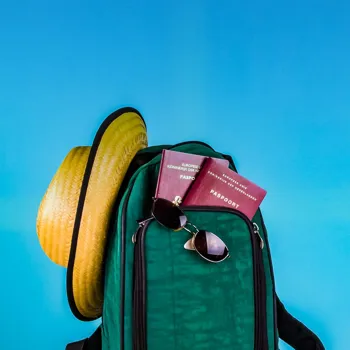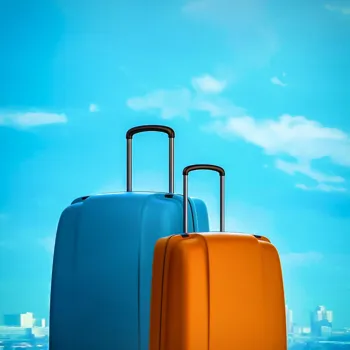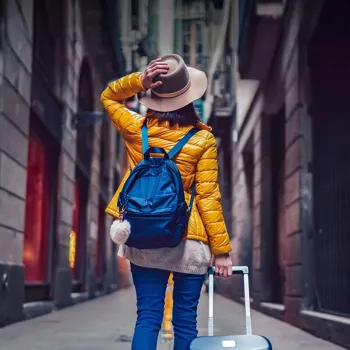Discover the Ultimate Guide to Travel Safety! Uncover 10 essential tips for a secure journey. Read on for expert advice
Travelling, be it within our own beautiful Bharat or to videsh, is an enriching experience.
It opens our minds, creates memories, and gives us stories to tell for years to come. But a dream vacation can quickly turn sour if safety is not given its due importance.
So, before you pack your bags and book that train or plane ticket, let's go through ten essential tips to ensure a smooth and secure journey. These tips cover everything from planning and packing to staying aware and connected while you are exploring new places.
Following these guidelines will help you minimize risks and maximize your enjoyment, allowing you to focus on the good stuff like soaking in the culture, stunning scenery, and maybe even discovering a new favourite chai stall!
Remember, a little bit of precaution goes a long way in ensuring your safety and peace of mind.
Plan Smart, Travel Safer:
Planning is the bedrock of any good trip, and it is especially important for a safe one. First, thoroughly research your destination. Understand the local customs, laws, and potential safety concerns. Check travel advisories issued by the Ministry of External Affairs.

They often provide important information on areas to avoid or specific risks to be aware of. Next, share your itinerary with family or close friends. Let them know where you are going, how you are getting there, and where you will be staying. This is crucial in case of an emergency.
Keep in touch with them regularly, updating them on your location and plans. Make copies of important documents such as your passport, visa, tickets, and hotel reservations. Store these copies separately from the originals.
Consider scanning them and emailing them to yourself or uploading them to a secure cloud storage service. This way, you will have access to them even if the originals are lost or stolen. Finally, familiarize yourself with local emergency numbers like police, ambulance, and fire department.
Save them in your phone and have them readily accessible. By investing time in planning, you are empowering yourself to handle unexpected situations with greater confidence and control.
Pack Light, Pack Right:
What you pack can directly impact your safety and overall travel experience. The aim is to pack light but smart, ensuring you have everything you need without burdening yourself with excess baggage. Firstly, avoid flashing expensive jewellery or carrying large amounts of cash.
Doing so can make you an easy target for thieves. Opt for carrying only the necessary amount of cash and rely on credit or debit cards where accepted. Notify your bank of your travel dates to avoid any issues with your cards.
Pack a basic first-aid kit with essentials like antiseptic wipes, bandages, pain relievers, and any personal medications you may need. A mini sewing kit can also come in handy for quick repairs.
Ensure you have comfortable and appropriate clothing and footwear suitable for the climate and activities you have planned. Avoid wearing overly revealing or culturally insensitive clothing in conservative areas.
A universal travel adapter is a must-have for international travel to ensure you can charge your devices. Carry a portable charger or power bank to keep your phone powered up, especially during long journeys or when you are out exploring. Finally, pack a small personal safety alarm.
These devices are inexpensive and can be very effective in deterring potential attackers.
Stay Alert, Stay Aware:
Staying alert and aware of your surroundings is perhaps the single most important thing you can do to ensure your safety while travelling. Pay attention to your gut feeling. If a situation feels uncomfortable or unsafe, remove yourself from it immediately.
Avoid walking alone in poorly lit or deserted areas, especially at night. When using public transportation, be mindful of your belongings and keep them close to you. Avoid placing your bag on the floor or hanging it on the back of your chair.
Do not leave your phone or other valuables unattended on tables or counters. Be wary of strangers who approach you offering assistance or trying to engage you in conversation, especially in crowded tourist areas. They may be pickpockets or scammers.
Trust your instincts and be polite but firm in declining their offers. Be aware of common scams in the area you are visiting. Research them beforehand so you know what to look out for.
Examples include fake police officers asking for your passport or individuals claiming to need money for a medical emergency. Avoid getting distracted by your phone or other devices while walking. This makes you less aware of your surroundings and more vulnerable to theft.
Staying constantly vigilant may seem tiring, but it is a small price to pay for your personal safety.
Secure Your Accommodation:
Your hotel or guesthouse should be a safe haven during your travels. Before booking, read online reviews to get an idea of the safety and security measures in place. Look for places with good ratings and positive feedback regarding security.
When you arrive, check the security features of your room, such as the locks on the doors and windows. Make sure they are in good working order. Use the provided safety latch or chain when you are inside the room.
Never open the door to anyone you are not expecting, even if they claim to be hotel staff. Call the front desk to verify their identity before opening the door. Use the hotel safe to store your valuables such as your passport, cash, jewellery, and electronic devices.
Make a list of the items you are storing in the safe as a record. Be discreet about displaying your room key in public areas. Return it to the front desk when not in use. If you are staying in a guesthouse or Airbnb, take extra precautions.
Meet the host during the day and get a thorough tour of the property. Enquire about security measures and local safety tips. Never reveal your room number to strangers. Always be polite and courteous but maintain a safe distance from people you do not know.
Use Transportation Wisely:
Getting around safely is an essential part of your travel experience. Whether you are taking a taxi, bus, or train, it is important to be mindful of your surroundings and take precautions. Firstly, use reputable transportation services. Avoid hailing taxis from the street, especially at night.

Instead, use ride-hailing apps or ask your hotel to book a taxi for you. Share your ride details with a friend or family member so they know where you are going. When taking public transportation, be aware of your belongings and keep them close to you.
Avoid placing your bag on the floor or hanging it on the back of your chair. Keep your phone and other valuables out of sight. If you are renting a car, inspect it thoroughly before driving off. Check the tires, brakes, lights, and mirrors.
Ensure you have insurance and that you understand the local traffic laws. Avoid driving at night in unfamiliar areas. Plan your route in advance and use a GPS device to help you navigate.
Be aware of potential scams targeting tourists in transportation hubs, such as fake taxi drivers or individuals offering unsolicited assistance. Trust your instincts and be assertive in declining unwanted offers. Always wear a seatbelt when in a car, whether you are the driver or a passenger.
This is the single most effective way to protect yourself in the event of an accident.
Stay Connected, Stay Informed:
In today's digital age, staying connected is essential for your safety and peace of mind while travelling. Ensure you have a reliable mobile phone and a local SIM card or international roaming plan. This will allow you to make calls, send messages, and access the internet.
Download useful travel apps such as maps, translation tools, and emergency contact information. Keep your phone charged and carry a portable charger or power bank to avoid running out of battery. Use social media and messaging apps to stay in touch with family and friends.
Share your location with them so they know where you are. Monitor local news and weather reports to stay informed about any potential risks or disruptions. Be cautious about using public Wi-Fi networks, as they may not be secure.
Avoid accessing sensitive information such as bank accounts or credit card details on public Wi-Fi. Instead, use a virtual private network (VPN) to encrypt your internet traffic and protect your data. Remember to keep your phone and other electronic devices secure.
Use a strong password or biometric authentication to prevent unauthorized access. Register your cell phone with the local authorities if there is an option.
Protect Your Health:
Your health is paramount, especially when travelling to new environments. Visit your doctor before your trip for any necessary vaccinations or boosters. Pack a comprehensive first-aid kit with essentials like antiseptic wipes, bandages, pain relievers, and any personal medications you may need.
Be sure to include any prescription medications you take regularly, along with copies of your prescriptions. Research any potential health risks in the area you are visiting, such as malaria, dengue fever, or Zika virus.
Take appropriate precautions, such as using insect repellent, wearing protective clothing, and sleeping under a mosquito net. Drink plenty of bottled water to stay hydrated, especially in hot climates. Avoid drinking tap water unless you are certain it is safe.
Be mindful of what you eat and practice food safety. Wash your hands thoroughly before eating and avoid eating from street vendors unless you are certain of their hygiene standards. Get adequate sleep to boost your immune system and reduce your risk of getting sick.
Pace yourself and avoid overexerting yourself, especially during the first few days of your trip. If you have any underlying health conditions, inform your travel companions and carry a medical ID card with your emergency contact information.
Purchase travel insurance that covers medical expenses, hospitalization, and repatriation in case of an emergency.
Be Culturally Sensitive:
Respecting local customs and traditions is not only a sign of good manners but also an important aspect of travel safety. Research the cultural norms and expectations of the area you are visiting. Dress modestly and respectfully, especially when visiting religious sites.
Learn a few basic phrases in the local language, such as "hello," "thank you," and "excuse me." This will show your respect and make it easier to communicate with locals. Be mindful of your body language and avoid gestures that may be considered offensive in the local culture.
Avoid public displays of affection and be respectful of personal space. Be aware of local laws and regulations, and avoid engaging in any activities that may be illegal or culturally unacceptable.
Respect local customs regarding photography and always ask for permission before taking pictures of people. Be mindful of noise levels and avoid making excessive noise in residential areas or religious sites. Learn about the local cuisine and be open to trying new foods and drinks.
Be respectful of local religious beliefs and practices and avoid making disparaging remarks about religion or culture.
Trust Your Intuition:
Your gut feeling is a powerful tool that can help you stay safe while travelling. If a situation feels uncomfortable or unsafe, trust your instincts and remove yourself from it immediately. If someone is making you feel uneasy, avoid engaging with them and find a way to politely disengage.

If you are lost or unsure of your surroundings, ask for help from a trusted source, such as a police officer or a hotel employee. Be wary of strangers who approach you offering unsolicited assistance or trying to engage you in conversation, especially in crowded tourist areas.
Trust your instincts and be polite but firm in declining their offers. If you feel like you are being followed, change direction or enter a public place such as a shop or restaurant. If you suspect that someone is trying to scam you, trust your instincts and walk away.
If you witness suspicious activity, report it to the local authorities. Remember, it is always better to err on the side of caution and trust your gut feeling. Your intuition is often right.
Emergency Preparedness:
Being prepared for emergencies can make a big difference in the outcome of an unexpected event. Familiarize yourself with local emergency numbers like police, ambulance, and fire department. Save them in your phone and have them readily accessible.
Create a list of important contacts, including family members, friends, and your embassy or consulate. Keep a copy of this list with you and share it with a trusted friend or family member. Know the location of the nearest hospital or medical clinic. Research it's contact numbers.
Learn basic first-aid skills so you can provide assistance in case of a minor injury. Carry a small whistle or personal safety alarm to attract attention in case of an emergency. Have a plan for what to do in case of a natural disaster such as an earthquake, flood, or hurricane.
Know the evacuation routes and designated emergency shelters. Keep a small emergency kit with essential items such as a flashlight, batteries, a first-aid kit, and a supply of non-perishable food and water. If you are travelling with children, have a plan for what to do if you get separated.
Teach them how to call for help and where to go for assistance. Remember, being prepared for emergencies can give you greater peace of mind and increase your chances of staying safe and secure while travelling.
AI Generated Content. Glance/InMobi shall have no liability for the content














